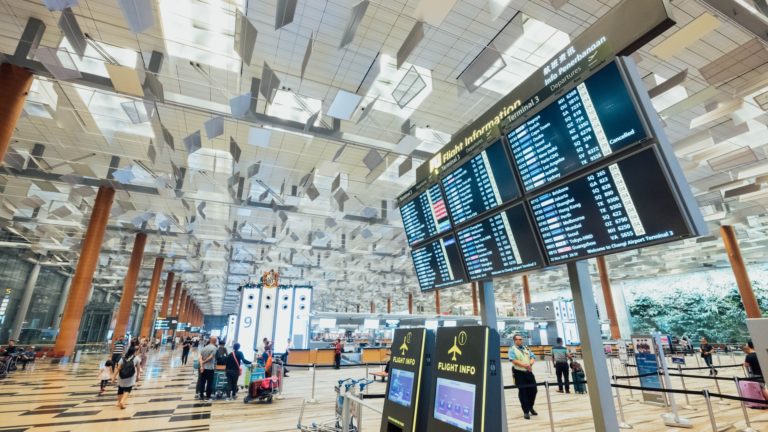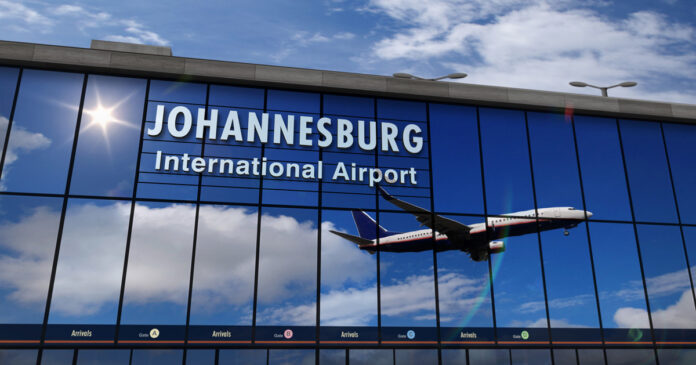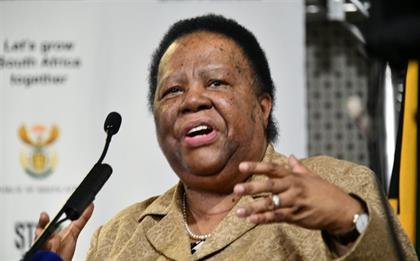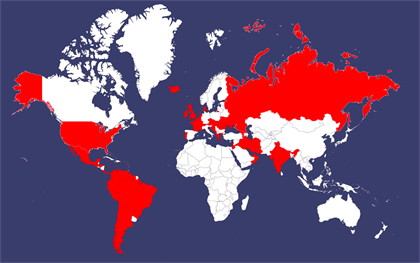List of countries that won’t allow South Africans in
Despite South Africa’s airports being open for international travel, a host of countries have banned travellers from the country following the discovery of a new COVID-19 variant.
According to Health Policy Watch, the World Health Organization (WHO) Director-General Dr Tedros Adhanom Ghebreyesus said in December 2020 that the body is ‘working with scientists to understand how these genetic changes affect how the virus behaves’.

A number of countries have banned travellers from South Africa.
Domestic tourism for South Africa seems to be the only kind of travel they will be doing since the country has gained such a bad reputation with the discovery of the new variant.
South Africa hopes to see a rebound in tourism but the suspension of the Johnson and Johnson vaccine rollout has led to a delay.
‘The UK has reported that this new variant transmits more easily but there is no evidence so far that it is more likely to cause severe disease or mortality,’ Ghebreyesus said.
‘The bottom line is that we need to suppress transmission of all SARS-COV-2 viruses as quickly as we can. The more we allow it to spread, the more opportunity it has to change.’
South Africa does allow international visitors with a negative COVID-19 test result not older than 72 hours. Travellers leaving and entering the country need to fill out a health questionnaire available on the Department of Health’s website.
Those without valid certification are required to quarantine at a government-appointed facility for 10 days at their own cost.
As a result of this fast-spreading variant, called 501.V2, a number of countries have closed their borders to travellers from certain destinations, including South Africa.
A mapping tool developed by travel website Skyscanner revealed that since 18 April, South Africa has 84 major restrictions from other countries and these countries could either be closed for entry, they have suspended travel, or entry may only be possible for those that are citizens.
However, South Africa does have 68 other countries where travel is possible, but you need to meet those travel requirements before entry.
The following countries do not currently allow visitors from South Africa:
Related Posts

Lions, Bones & Bullets: new documentary sheds light on wildlife trafficking
21 November 2022
‘Lions, Bones & Bullets’ is a new documentary that sheds light onto South Africa’s controversial. read more

Alcohol banned at Qatar FIFA World Cup except for this designated area
21 November 2022

See the Augrabies Falls in all its splendour
21 November 2022
Augrabies Falls have continued to rise over the weekend of 19 November, reaching levels of. read more
yoast-primary –
tcat – Travel news
tcat_slug – travel-news
tcat2 –
tcat2_slug –
tcat_final –


Get more than 50% off on a stay at Hlosi Game Lodge in Addo
Road tripping from Jozi to Bela-Bela: Places to see on the way
Visit Little Africa with this big special: only R4 599 for a two-night stay
An overnight stay for 2 people at Kololo Game Lodge for R4 499
City escapes 90 minutes from Cape Town: go wild in Worcester
Contact Us CAPE TOWN OFFICE 36 Old Mill Road, Ndabeni 7405 Western Cape Telephone: (021) 530 3300 Email: [email protected]
We only use cookies on this Site for particular features to work, the cookies do not collect and/or store any personal information about you.
Privacy Overview
This website uses cookies to improve your experience while you navigate through the website. Out of these, the cookies that are categorized as necessary are stored on your browser as they are essential for the working of basic functionalities of the website. We also use third-party cookies that help us analyze and understand how you use this website. These cookies will be stored in your browser only with your consent. You also have the option to opt-out of these cookies. But opting out of some of these cookies may affect your browsing experience.
Necessary cookies are absolutely essential for the website to function properly. These cookies ensure basic functionalities and security features of the website, anonymously.
| Cookie | Duration | Description |
|---|---|---|
| cookielawinfo-checkbox-analytics | 11 months | This cookie is set by GDPR Cookie Consent plugin. The cookie is used to store the user consent for the cookies in the category “Analytics”. |
| cookielawinfo-checkbox-functional | 11 months | The cookie is set by GDPR cookie consent to record the user consent for the cookies in the category “Functional”. |
| cookielawinfo-checkbox-necessary | 11 months | This cookie is set by GDPR Cookie Consent plugin. The cookies is used to store the user consent for the cookies in the category “Necessary”. |
| cookielawinfo-checkbox-others | 11 months | This cookie is set by GDPR Cookie Consent plugin. The cookie is used to store the user consent for the cookies in the category “Other. |
| cookielawinfo-checkbox-performance | 11 months | This cookie is set by GDPR Cookie Consent plugin. The cookie is used to store the user consent for the cookies in the category “Performance”. |
| viewed_cookie_policy | 11 months | The cookie is set by the GDPR Cookie Consent plugin and is used to store whether or not user has consented to the use of cookies. It does not store any personal data. |
Functional cookies help to perform certain functionalities like sharing the content of the website on social media platforms, collect feedbacks, and other third-party features.
Performance cookies are used to understand and analyze the key performance indexes of the website which helps in delivering a better user experience for the visitors.
Analytical cookies are used to understand how visitors interact with the website. These cookies help provide information on metrics the number of visitors, bounce rate, traffic source, etc.
Advertisement cookies are used to provide visitors with relevant ads and marketing campaigns. These cookies track visitors across websites and collect information to provide customized ads.
Other uncategorized cookies are those that are being analyzed and have not been classified into a category as yet.
List of High Risk Countries Banned From Travel to South Africa

List of High Risk Countries Banned From Travel to South Africa. Photo: iStockPhoto
While travellers from all African countries are allowed in and out of SA, visitors from the countries listed below will not yet be allowed permission to travel to South Africa… but this will be revised in a couple of weeks’ time. UPDATE 11 November 2020 : ALL countries are now allowed to visit South Africa. There is no more ‘red list’ or ‘banned list’.
Transport Minister Fikile Mbalula said the airlines from the countries which are permitted to visit and depart from SA will be given notice by the government to travel into SA. Their citizens will be allowed to travel into SA from 01 October 2020 and re-ignite international tourism in South Africa. (Likewise South Africans will be allowed to travel to these countries.) Mbalula said he’s already heard “the Germans are coming tomorrow”. (The French, English and Greek, along with many other foreign citizens will not yet be welcome!)
All passengers will need to adhere to certain restrictions such as having proof of a negative Covid-19 test within 72 hours of their trip. (See further regulations below the list.)
South Africa has developed a risk categorisation model for different international travellers – low, medium and high risk. High risk travellers are those who come from countries with higher numbers of COVID-19 infections and reported deaths compared to South Africa, said DIRCO Minister Naledi Pandor.
“Medium risk travellers are from countries with relatively equal number of infections and death toll to South Africa and low risk travellers obviously originate from countries with lesser number of infections of COVID-19 and death toll than South Africa.
“Leisure Travellers from high risk countries will not be permitted.
“The exception will be business travellers with scarce and critical skills including diplomats, repatriated persons, investors and people participating in professional sporting and cultural events will undergo the same health protocol screenings.” (See How to apply for business travel to South Africa from a banned country.)
For those desperate to visit SA, they could fly via a non-banned country and spend 10 days there before flying to SA (see travel regulations beneath the list).
Countries will be assessed every fortnight. The following list was announced by Home Affairs Minister, Dr Aaron Motsoaledi and published on the government’s news website.
List of Countries which CANNOT visit South Africa from 01 October 2020 (Official Govt List):
UPDATE 20h41 : The above list has been updated after the Government realised that Dr Motsoaledi had not read out the first column. The govt said: “Earlier today, a list of high risk countries was read at a Press Conference. Unfortunately this list was not exhaustive, and might also have included some countries by mistake. We are hereby releasing the whole updated list, and we heartily apologize for any confusion and any inconvenience caused by the earlier release.”
SIGN THE PETITION FOR A PASSPORT EMERGENCY EXTENSION FOR SOUTH AFRICANS ABROAD.
Regulations for Travellers to South Africa
DIRCO Minister Pandor said today: “All travellers visiting the country will be expected to abide by the regulations which include mandatory wearing of masks at all times, practising social distancing in public spaces, regular washing or sanitizing of hands and presenting a negative COVID-19 test result not older than 72 hours from the time of departure.”
Travellers are encouraged to download the COVID-Alert APP which alerts subscribers and provides relevant information if they have been in contact with any person who has tested positive for the virus.
The Minister said: “Travellers intending to visit the country will be expected to produce a PCR (polymerase chain reaction) test that is not older than 72 hours from the time of departure from the country of origin to South Africa. This test must be conducted by a certified medical practitioner and should have the name and signature of the practitioner who conducted such test.
“Upon arrival in the port of entry, the traveller will be screened for any COVID-19 symptoms or for contact with people who have been infected with the COVID-19 virus.
“Travellers will also need to provide proof of accommodation address should they need to self-quarantine at the time of arrival in the country.
“Should the traveller display any COVID-19–related symptoms or been in contact with an infected person(s), they will be expected to take a mandatory COVID-19 test. This test will be at the traveller’s cost. If the COVID-19 test comes back positive, the traveller will be subjected to a 10 day quarantine at a designated site. The accommodation at a quarantine site will be at the traveller’s cost,” she said.
If the passport of the traveller from a high risk country indicates that he/she has spent 10 days or more in a low risk country before departure, he/she will be considered to be arriving from a low risk country.
Travellers from medium and low risk countries will only be allowed into the country subject to the prevailing visa requirements.
Airlines from high risk countries are not necessarily banned, but their crew will be required to isolate in facilities at designated accommodation at the cost of their employer.
Long term visa holders who visit the country for business purposes will be allowed to travel to South Africa. These travellers will also be subject to health screenings for COVID-19 symptoms at the port of entry.
“In the interest of all citizens, and the continuing public health efforts, South Africa reserves the right to deny entry of any traveller who is travelling from a high risk country for tourism purposes,” said the Minister.
Re-opening of South African airports for travel by air
Three airports will be opened and operational for international air travel:
- OR Tambo International (in Johannesburg, Gauteng),
- Cape Town International (in Cape Town, Western Cape) and
- King Shaka International in (Durban, KwaZulu-Natal).
All travellers landing at these airports must present a PCR test which is not older than 72 hours from the time of departure from the country of origin to South Africa. Furthermore, the international travellers should possess a mandatory travel insurance which is supposed to cover the COVID-19 test and quarantine costs. All these travellers will be subjected to COVID-19 screening on arrival. Those who present COVID-19 symptoms which include elevated body temperatures and flu-like symptoms, will be required to take a COVID-19 test which should be covered by the travel insurance. Should the test results come back positive, the traveller will be subjected to mandatory quarantine, which will also be paid for by the traveller or the travel insurance.
Travellers from African Countries
To facilitate free movements of people, goods and services from South Africa, SADC and the African continent, travellers from the neighbouring countries are allowed to visit our country.
Travellers from all African countries are allowed and must possess relevant travel documents, and will also be screened for COVID-19 symptoms.
To allow ease of travel from the African countries, 18 borders will be opened. 35 border posts will continue to offer restricted services due to insufficient capacity for screening, testing and quarantine. Travellers who present themselves at borders which are unable to accommodate them will be directed to the currently operational border posts for processing.
Daily commuters who reside in cross-border areas/towns and those who are from neighbouring countries including those with relevant work permits and school children and teachers will be allowed to enter and exit the borders for work purposes. These commuters will be screened for COVI-19 symptoms and where necessary will be subjected to quarantine and isolation. Furthermore, these commuters will be expected to wear face masks, wash hands and sanitise regularly and practise social distancing measures.
Sea ports operations
To facilitate ease of transportation of goods and medicines to and from the country, ships will be allowed to dock, load and off-load cargo. Crew members from the cargo ships will be allowed to crew changes. These crew members will also be medically screened for COVID-19 symptoms. Passenger liners for luxury travel are still not allowed to dock and off-load passengers.
SIGN THE PETITION FOR A PASSPORT EMERGENCY EXTENSION FOR SOUTH AFRICANS ABROAD.
No UK or US tourists: Here is South Africa’s full red list of countries

Update: SA’s red list just went from 60 to 22 countries – but US and UK tourists are still banned
* This article has been updated throughout with the latest available information announced at a press conference. While Brazil was initially omitted from the list during a briefing on Wednesday, government later confirmed that it was a high-risk country. A written – but apparently not yet formally in force – red list of countries was published later on Wednesday night.
South Africa will use its own level of coronavirus risk to determine what countries are considered high, medium, or low risk, international relations minister Naledi Pandor announced on Wednesday at a press conference on new travel measures.
Those with significantly higher levels of infection spread and deaths than South Africa will be rated as high risk – and leisure travellers from those countries will not be permitted entry into South Africa.
The only exceptions will be those with high-skills visas, diplomats, sports people, and investors.
“We’ve agreed that we will gradually open our borders and ports of entry of international travellers, primarily in the first instance for business and some leisure travellers,” Pandor said – strongly stressing that it will be “some” leisure travellers – “and other aspects of travel such as investors coming into South Africa [and] sea crews that need to spend a short time, having docked in our ports. So we still are in a restricted domain, but we are gradually opening up.”
The list of countries currently considered high risk, and from which ordinary tourists are not allowed is, in full:
- Albania
- Argentina
- Armenia
- Austria
- Bahrain
- Belgium
- Bolivia
- Bosnia and Herzegovina
- Brazil
- Chile
- Columbia
- Costa Rica
- Croatia
- Czech Republic
- Denmark
- Ecuador
- France
- Georgia
- Greece
- Guatemala
- Guyana
- Honduras
- Hungary
- Iceland
- India
- Iran
- Iraq
- Ireland
- Israel
- Jamaica
- Jordan
- Kuwait
- Lebanon
- Luxembourg
- Maldives
- Malta
- Mexico
- Moldova
- Montenegro
- Nepal
- Netherlands
- North Macedonia
- Oman
- Palestine
- Panama
- Paraguay
- Peru
- Portugal
- Puerto Rico
- Qatar
- Romania
- Russia
- Slovakia
- Suriname
- Switzerland
- Ukraine
- United Emirates
- United Kingdom
- USA
- Venezuela
See also: After an initial mistake, govt confirms Brazil is high risk – no tourism to SA allowed
This is what that list looks like when translated to a map:

All countries on the African continent automatically fall outside the high-risk category, ministers said, so tourists will be allowed to travel to and from those countries regardless of their SARS-CoV-2 statistics.
“If the passport of the traveller from a high risk country indicates that he/she has spent 10 days or more in a low risk country before departure, he/she will be considered to be arriving from a low risk country,” one government statement said.
The list will be reviewed every two weeks, Pandor said, based on seven days worth of data.
President Cyril Ramaphosa announced the reopening of South Africa’s borders for leisure travellers in mid-September, and immediately cautioned that there may be restrictions for travel to and from some countries, “based on the latest scientific data we can get on those countries”.
There had been no indication from the government in the intervening two weeks as to what metrics would be used
See also | Foreign travel guaranteed only to and from other African countries, cruise ships not welcome
All travellers, including those from elsewhere in Africa, will be required to present a negative test result for the coronavirus that is less than 72 hours old, or face quarantine.
Airlines will also be required to ensure that travellers to South Africa have travel insurance before boarding, Pandor said.
Several airlines expect to resume flights to South Africa, including from countries with high and rising rates of infection.
* This article has been updated throughout to reflect the latest available information.
Source https://www.getaway.co.za/travel-news/these-countries-have-banned-south-african-travellers/
Source https://www.sapeople.com/2020/09/30/list-of-high-risk-countries-banned-from-travel-to-south-africa/
Source https://www.businessinsider.co.za/countries-on-south-africas-coronavirus-travel-restricted-red-list-2020-9